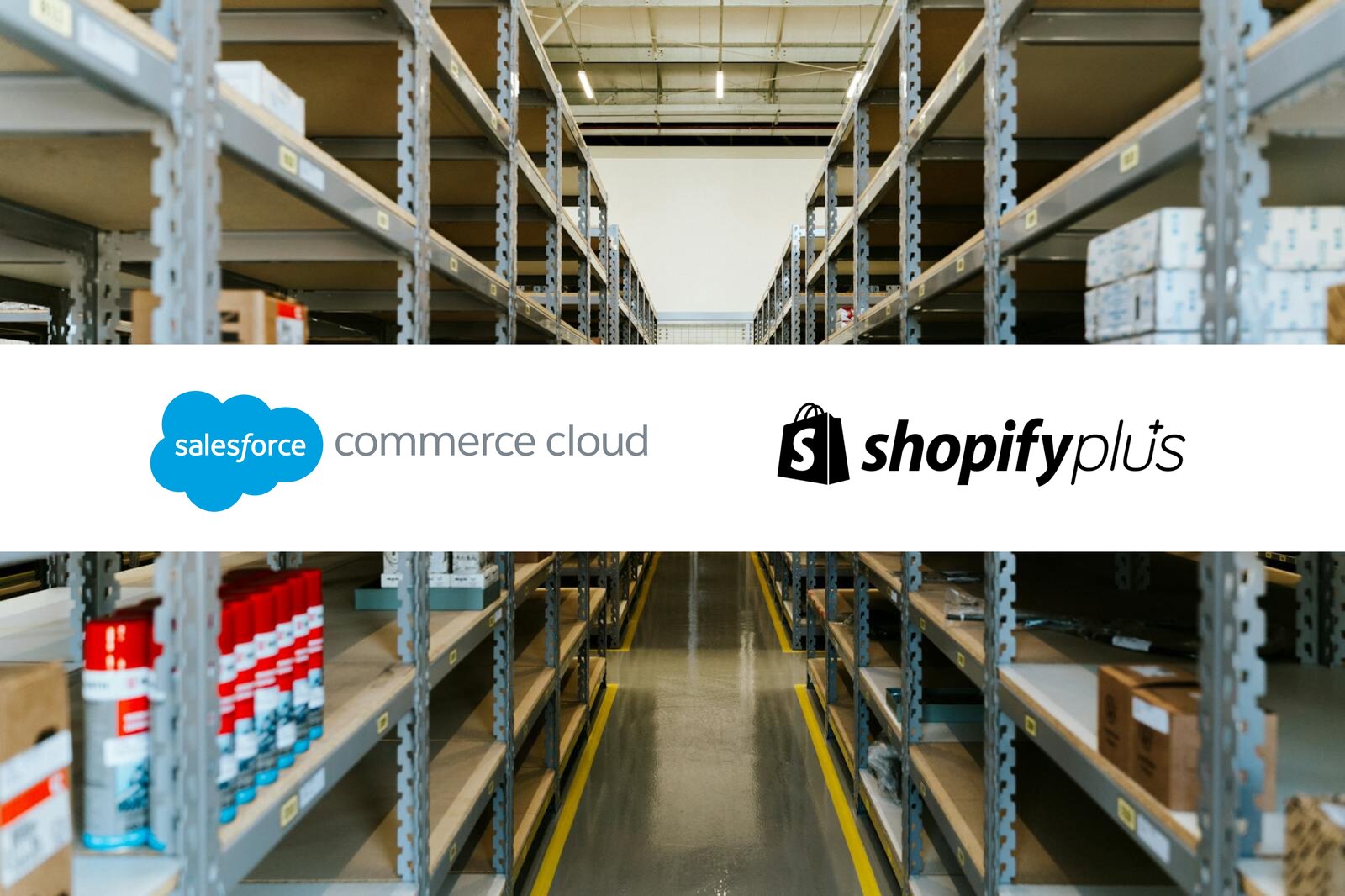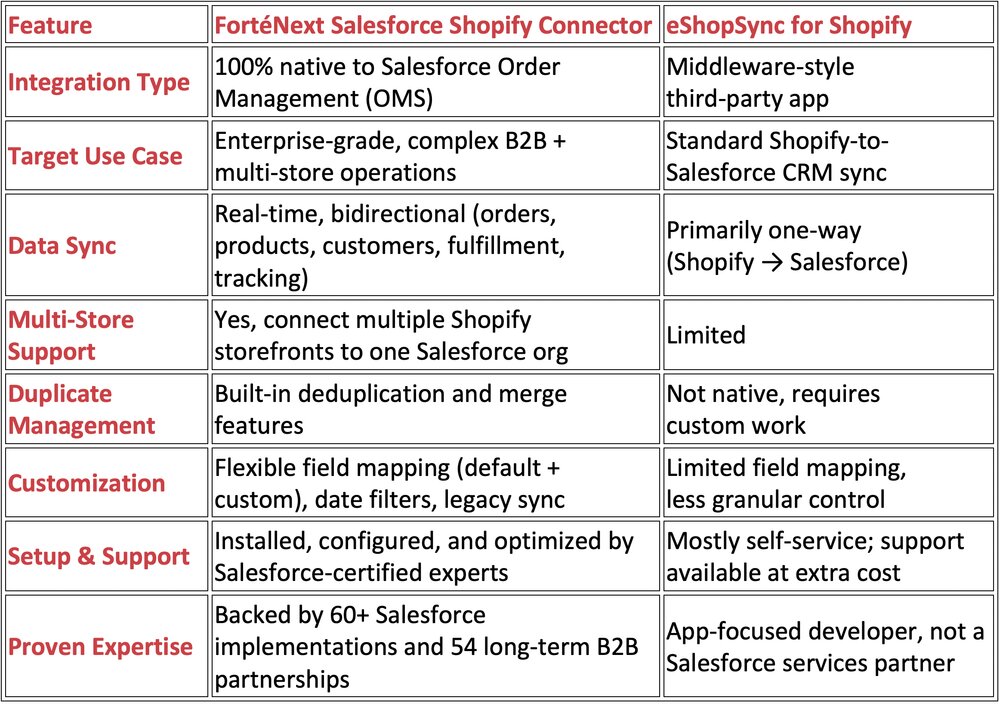
This article explores what each platform is, their main differences, and how they compare across enterprise readiness, customization, scalability, CRM integration, data consolidation, pricing, and outsourcing considerations.
Salesforce B2B (and D2C) Commerce Cloud is an enterprise-grade, cloud-hosted e-commerce platform. Built specifically for large-scale retailers and B2B companies, it offers advanced tools for multi-channel commerce, personalization, order management, and integration with the broader Salesforce ecosystem.
Its strengths lie in customer-centric features: AI-driven recommendations through Einstein, seamless integration with Sales Cloud and Service Cloud, and the ability to unify customer experiences across digital and physical touchpoints. Commerce Cloud is often chosen by businesses with complex catalogs, high transaction volumes, and a need for deep customization.
Shopify is one of the most popular cloud-based e-commerce platforms globally, primarily serving small-to-midsize businesses. Known for its ease of use, it allows companies to set up an online store quickly with pre-built templates, a large app marketplace, and built-in payment processing.
Its strength lies in simplicity: non-technical teams can get a storefront live within hours, and scaling businesses can use its app ecosystem to add more features. Shopify is especially favored by D2C brands and entrepreneurs looking for a quick go-to-market solution.
Shopify Plus is the enterprise version of Shopify, designed for companies generating high sales volumes. It provides enhanced API limits, greater automation tools (like Shopify Flow and Launchpad), and more support from Shopify’s dedicated account teams.
While Shopify Plus retains Shopify’s simplicity, it expands its scalability and customization capabilities. It is often the choice of fast-growing consumer brands that want enterprise-level support without committing to the heavier infrastructure and complexity of platforms like Salesforce Commerce Cloud.
When comparing Shopify Plus and Salesforce Commerce Cloud for enterprise use, the choice usually comes down to complexity versus speed.
In practice, global enterprises sometimes use both: Shopify Plus for fast-moving D2C channels and Salesforce Commerce Cloud for their more complex or B2B-facing operations.
Customization is a critical deciding factor for many businesses.
In short: Shopify is simpler but more limited, while Salesforce Commerce Cloud is more customizable but requires greater investment in development resources.
Scalability is essential for enterprise e-commerce.
For enterprises running large catalogs, multiple regions, and complex order flows, Salesforce Commerce Cloud offers deeper operational scalability. For consumer brands handling high traffic with straightforward product lines, Shopify Plus is typically sufficient.
Shopify’s app marketplace includes several CRM integrations, the most popular being HubSpot for Shopify and Salesforce Connector by eShopSync.
These apps bridge Shopify’s retail-first model with enterprise-grade CRM tools, allowing companies to consolidate customer insights and marketing automation.
Cost is often one of the largest differentiators.
In summary: Shopify Plus is generally cheaper and more predictable, while Salesforce Commerce Cloud scales in cost with revenue and complexity.
Data consolidation between spreadsheets and e-commerce platforms is a common need for operations teams.
For enterprises running both Salesforce and Shopify, middleware platforms such as MuleSoft or Celigo can act as integration hubs, ensuring data consistency across systems.
Salesforce Agentforce is the AI-driven agent layer within the Salesforce ecosystem. It integrates with e-commerce platforms like Shopify through APIs and connectors.
For example, Agentforce can:
When connected to Shopify via apps like eShopSync or custom middleware, Agentforce brings Salesforce’s AI-powered service capabilities into the Shopify environment, enhancing customer support and personalization.
Both B2B and D2C companies frequently outsource the implementation and ongoing management of their e-commerce platforms.
In both ecosystems, outsourcing allows businesses to bridge skill gaps, accelerate time to market, and reduce the burden of technical maintenance, while focusing internal teams on core business strategy.
Choosing between Salesforce Commerce Cloud and Shopify (or Shopify Plus) depends on a company’s size, complexity, and growth model. Shopify Plus offers ease, predictability, and speed - perfect for D2C-focused enterprises. Salesforce Commerce Cloud delivers deep customization, advanced scalability, and tight CRM integration - ideal for B2B enterprises with complex operations.
In practice, many companies use a mix of both, outsourcing expertise as needed to partners who can help them scale confidently in their chosen ecosystems.
One of the most common challenges for enterprises running both Shopify and Salesforce is keeping data synchronized between the two. Orders, products, and customer records often end up scattered across platforms, creating inefficiencies and manual workarounds. This is where FortéNext’s Salesforce Shopify Connector comes in.
The connector is a 100% native solution for Salesforce Order Management (OMS), designed to make Shopify data directly available within Salesforce. By integrating storefront and back-office operations, businesses can manage all orders from a single hub, regardless of where they originated.
FortéNext’s Salesforce Shopify Connector stands apart from apps like eShopSync because it’s 100% native to Salesforce Order Management, built for enterprise-grade B2B and multi-store operations, and delivered with expert implementation rather than self-service setup.
Unlike middleware-based apps, it provides real-time, bidirectional syncing of products, customers, and orders, advanced duplicate management, and flexible field mapping; FortéNext ensures the connector isn’t just a tool but a scalable, reliable solution backed by deep Salesforce expertise.

With more than 60 Salesforce implementations and 54 long-term B2B partnerships, FortéNext has established itself as the #1 Salesforce implementation partner for complex B2B industries. The connector is delivered as a fixed-scope solution, ensuring enterprises get a reliable, proven integration that scales with business needs.
As Nadiya Kreynin, CEO of FortéNext, explains:
“Our Salesforce Shopify Connector builds a bridge between your Shopify store and Salesforce. The package can integrate single or multiple Shopify stores with your Salesforce org and sync critical data between the two.”
For manufacturers, healthcare providers, distributors, retailers, or fintech companies running Shopify storefronts alongside Salesforce ecosystems, this connector provides a fast, reliable way to consolidate operations and supercharge order management.